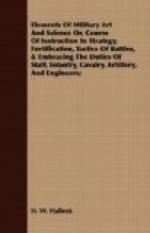This system of appointment to the army has produced the most satisfactory results, and has received the commendation of our best military men, and the approbation of all our presidents and most able statesmen. Nevertheless, it has occasionally met with strong opposition; this opposition springing in part from a want of proper information respecting the character and working of the system, and in part from the combined efforts of those who from negligence or incapacity have failed to pass their examinations for promotion, and of those who, from a conscious want of qualifications or merit, feel assured that they cannot obtain commissions in the army so long as this system of merit, as fixed by examination, shall exist. Hence the effort to destroy the Military Academy and to throw the army entirely open to political appointment.
Several legislative bodies, acting under these combined influences, have passed resolutions, giving various objections to the Military Academy, and recommending that it be abolished. The objections made by the legislatures of Tennessee, Ohio, Connecticut, New Hampshire, and Maine, are mostly founded on false information, and may be readily answered by reference to the official records of the War-office. But it is not the present object to enter into a general discussion of the charges against that institution, except so far as they are connected with the importance of military education, and the rules of military appointment and promotion.
It has been alleged by many of the opponents of the West Point Academy, that military instruction is of little or no advantage to a general;—that in the wars of Napoleon, and in the American Revolution, and the American war of 1812, armies were generally led to victory by men without a military education, and unacquainted with military science;—and that in the event of another war in this country, we must seek our generals in the ranks of civil life, rather than among the graduates of our Military Academy.
The objection here made to military education will hold with equal force against education in any other profession. We sometimes find men who have become eminent in the pulpit and at the bar, or in medicine and the sciences, without ever having enjoyed the advantages of an education in academic or collegiate halls, and perhaps even without that preliminary instruction usually deemed necessary for professional pursuits. Shall we therefore abolish all our colleges, theological seminaries, schools of law and medicine, our academies and primary schools, and seek for our professional men among the uneducated and the ignorant? If professional ignorance be a recommendation in our generals, why not also in our lawyers and our surgeons? If we deem professional instruction requisite for the care of our individual property and health, shall we require less for guarding the honor and safety of our country, the reputation of our arms, and the lives of thousands of our citizens?




